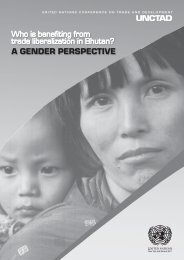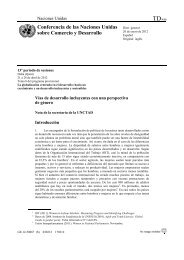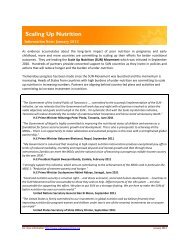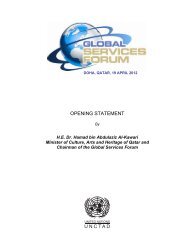draft declaration of the least developed countries - unctad xiii
draft declaration of the least developed countries - unctad xiii
draft declaration of the least developed countries - unctad xiii
Create successful ePaper yourself
Turn your PDF publications into a flip-book with our unique Google optimized e-Paper software.
DECLARATION OF THE LEAST DEVELOPED COUNTRIES MINISTERIAL<br />
MEETING AT UNCTAD XIII<br />
We, <strong>the</strong> Ministers <strong>of</strong> <strong>the</strong> <strong>least</strong> <strong>developed</strong> <strong>countries</strong>, having met in Doha, Qatar, on 19 April<br />
2012, during <strong>the</strong> thirteenth session <strong>of</strong> <strong>the</strong> United Nations Conference on Trade and<br />
Development (UNCTAD XIII), held from 21 to 26 April 2012,<br />
Recalling <strong>the</strong> Millennium Declaration and <strong>the</strong> Millennium Development Goals (MDGs),<br />
aimed inter alia at reducing extreme poverty by half by 2015<br />
Recalling <strong>the</strong> Istanbul Declaration and <strong>the</strong> Programme <strong>of</strong> Action (IPoA) for <strong>the</strong> Least<br />
Developed Countries for <strong>the</strong> Decade 2011-2020,<br />
Emphasizing <strong>the</strong> critical importance <strong>of</strong> mainstreaming <strong>the</strong> Istanbul Programme <strong>of</strong> Action into<br />
national and international policies and development frameworks,<br />
Emphasizing fur<strong>the</strong>r <strong>the</strong> importance <strong>of</strong> full and effective implementation <strong>of</strong> <strong>the</strong> agreed<br />
commitments and priority areas as contained in <strong>the</strong> Istanbul Programme <strong>of</strong> Action,<br />
Underlining <strong>the</strong> critical importance <strong>of</strong> <strong>the</strong> conclusion <strong>of</strong> <strong>the</strong> negotiations on Doha<br />
Development Agenda and development-related outcomes that take fully into account <strong>the</strong><br />
trade and development needs, challenges and priorities <strong>of</strong> LDCs,<br />
Reaffirming <strong>the</strong> primordial functions and mandates <strong>of</strong> UNCTAD in <strong>the</strong> three pillars, namely,<br />
research and policy analysis, technical cooperation and intergovernmental consensus building<br />
to advance <strong>the</strong> trade and development interests <strong>of</strong> developing <strong>countries</strong>, particularly LDCs,<br />
Adopt <strong>the</strong> following Declaration:<br />
1. We are pleased to note significant qualitative changes in our domestic policy<br />
environment, where successive policy reforms and adjustment programmes<br />
implemented over <strong>the</strong> years have led to a substantial improvement in our <strong>countries</strong>'<br />
domestic policies and strategies.<br />
2. We reaffirm our commitments to continue improving our domestic policies, including<br />
in <strong>the</strong> context <strong>of</strong> our respective long-term national development strategies and visions<br />
aimed at accelerating economic growth and poverty reduction, structurally<br />
transforming our economies and meeting <strong>the</strong> criteria for graduation from <strong>the</strong> LDC<br />
category.<br />
3. We are determined to place economic development at <strong>the</strong> centre <strong>of</strong> our domestic<br />
policies and strategies, including efforts to build developmental State as key to drive<br />
economic growth, accelerate structural transformation and build productive capacities<br />
<strong>of</strong> our <strong>countries</strong>. We underline <strong>the</strong> importance <strong>of</strong> balanced role <strong>of</strong> <strong>the</strong> State and<br />
market considerations, where <strong>the</strong> State designs policies and institutions with a view to<br />
achieving sustainable and inclusive economic growth as well as creates an<br />
appropriate enabling stable, transparent and rules-based economic environment for<br />
<strong>the</strong> effective functioning <strong>of</strong> markets.<br />
4. We are committed to make our domestic development agenda for <strong>the</strong> coming decade<br />
to focus on streng<strong>the</strong>ning domestic institutions, mobilizing private savings and<br />
improving <strong>the</strong> tax collection system. Such efforts are crucial to augment government<br />
revenues and rationalize spending with a view to eliminating areas <strong>of</strong> overexpenditure<br />
and ensuring <strong>the</strong> efficient use <strong>of</strong> resources.<br />
1
5. We are concerned that, despite some improvements, in <strong>the</strong> 2000s, in external<br />
economic environment, <strong>the</strong> LDCs’ share in international trade still stands below 1 per<br />
cent; FDI inflows are still hugely concentrated in extractive industries and has not led<br />
to employment generation and poverty reduction; and external <strong>of</strong>ficial aid flows have<br />
seen only modest improvements and remain below international agreed targets.<br />
6. We are mindful that <strong>the</strong> implementation <strong>of</strong> previous programmes <strong>of</strong> action has not<br />
been able to bring about much desired socio-economic transformation in <strong>the</strong> LDCs<br />
and underline that this should serve a lesson for <strong>the</strong> international community that<br />
‘business as usual’ cannot be an option to deal with a multitude <strong>of</strong> problems <strong>the</strong><br />
LDCs face.<br />
7. We acknowledge that improvements in our domestic policy environment and external<br />
economic conditions were factors behind our <strong>countries</strong>' strong average rate <strong>of</strong> GDP<br />
growth (7.1%) in 2000s, in particular during 2002-2008. However, in 2009, at <strong>the</strong><br />
height <strong>of</strong> <strong>the</strong> global financial and economic crises, <strong>the</strong> average GDP growth rate<br />
declined to a mere 4.6 per cent, reflecting structural weakness and vulnerability<br />
inherent in our economies.<br />
8. We are concerned, <strong>the</strong>refore, that not only <strong>the</strong> recent growth rates are far lower than<br />
<strong>the</strong> agreed target <strong>of</strong> 7% in order for our <strong>countries</strong> to make progress towards<br />
internationally agreed development targets, including MDGs, but <strong>the</strong>y are also<br />
fragile, weak and vulnerable to external shocks. This complicates and frustrates<br />
efforts to halve <strong>the</strong> proportion <strong>of</strong> our people living in extreme poverty by 2015,<br />
making our <strong>countries</strong> <strong>the</strong> locus <strong>of</strong> massive poverty and, if <strong>the</strong> current trends continue,<br />
<strong>the</strong> absolute number <strong>of</strong> poor people in our <strong>countries</strong> will keep increasing.<br />
9. We are fur<strong>the</strong>r concerned that <strong>the</strong> LDCs continue to be vulnerable to a variety <strong>of</strong><br />
external shocks, including those emanating from food, fuel, financial and economic<br />
crises, and natural disasters. These multiple crises toge<strong>the</strong>r with <strong>the</strong> adverse impacts<br />
<strong>of</strong> climate change on <strong>the</strong> LDCs and conflicts in some cases have eroded some <strong>of</strong> <strong>the</strong><br />
modest development gains made by <strong>least</strong> <strong>developed</strong> <strong>countries</strong> over <strong>the</strong> last decade.<br />
10. In this regard, we urge our trading and development partners, including developing<br />
<strong>countries</strong> that are in a position to do so, to:<br />
10.1. Redouble efforts to enhance <strong>the</strong>ir support to <strong>the</strong> LDCs to enable <strong>the</strong>m<br />
to attain internationally agreed development goals, including MDGs and <strong>the</strong><br />
targets <strong>of</strong> <strong>the</strong> Istanbul Programme <strong>of</strong> Action.<br />
10.2. Expedite on-going efforts to improve aid effectiveness that should go<br />
beyond improving aid management, coordination, harmonization <strong>of</strong><br />
accounting and reporting standards, and lead to fundamental changes in aid<br />
policies and donor practices so that development aid links with national<br />
priorities <strong>of</strong> recipient <strong>countries</strong> through direct budgetary support.<br />
10.3. Urgently meet internationally agreed ODA targets as <strong>the</strong> LDCs<br />
continue to depend on such resources to finance <strong>the</strong>ir development needs<br />
given <strong>the</strong>ir limited capacity to generate domestic resources. Improving <strong>the</strong><br />
quality and quantity <strong>of</strong> aid should also lead to a rebalancing <strong>of</strong> priorities<br />
between <strong>the</strong> social and productive capacity sectors with increased attention to<br />
<strong>the</strong> latter. Moreover, aid should be free <strong>of</strong> conditionalities underscoring <strong>the</strong><br />
principles <strong>of</strong> national leadership and ownership <strong>of</strong> <strong>the</strong> LDCs in <strong>the</strong><br />
development process.<br />
10.4. Reduce <strong>the</strong> potential risk <strong>of</strong> recurrent debt crisis including by<br />
providing future development assistance in favour <strong>of</strong> our <strong>countries</strong> in <strong>the</strong><br />
2
form <strong>of</strong> grants ra<strong>the</strong>r than loans and by seeking lasting solution to <strong>the</strong> LDCs<br />
indebtedness<br />
10.5. Agree fur<strong>the</strong>r on <strong>the</strong> need <strong>of</strong> devising a new international support<br />
architecture that should go beyond <strong>the</strong> confines <strong>of</strong> ODA and market access<br />
and include, in a holistic manner, transfer <strong>of</strong> technology and know-how as<br />
well as building technological capabilities and innovation in our <strong>countries</strong>.<br />
The new international support architecture should be based on integrated<br />
approach encompassing all support measures in <strong>the</strong> areas <strong>of</strong> trade, ODA, FDI<br />
and technology transfer, among o<strong>the</strong>rs, complementing each o<strong>the</strong>r in a<br />
coherent and coordinated manner. Tailored international policies and support<br />
measures should be adopted based on heterogeneous nature <strong>of</strong> <strong>the</strong> LDCs’<br />
economies to address specific national development challenges, needs and<br />
priorities, while maintaining <strong>the</strong> LDCs’ policy space.<br />
10.6. Adopt appropriate policies and measures to promote and enhance flows<br />
<strong>of</strong> foreign direct investment and <strong>the</strong> transfer <strong>of</strong> technology to our <strong>countries</strong><br />
including through <strong>the</strong> relevant provisions <strong>of</strong> TRIPS Agreement. Efforts in<br />
<strong>the</strong>se areas should also include such measures as insurance, guarantees and<br />
preferential financing programmes and private enterprise funds for<br />
investment in <strong>least</strong> <strong>developed</strong> <strong>countries</strong> focusing in particular on sectors that<br />
are needed to build up a diversified production base and encourage linkages<br />
with domestic production activities as well as employment creation.<br />
10.7. Improve market access conditions by urgently implementing <strong>the</strong><br />
commitments to grant duty-free and quota-free access for all products <strong>of</strong> all<br />
our exports on lasting basis, consistent with decision 36 <strong>of</strong> Annex F <strong>of</strong> <strong>the</strong><br />
Hong Kong WTO Ministerial Declaration. This should include efforts to<br />
remove market entry barriers such as non-tariff measures and o<strong>the</strong>r trade<br />
barriers. Efforts by trading and development partners should also include<br />
secured, simplified, harmonized and flexible rules <strong>of</strong> origin.<br />
10.8 Implement fully and expeditiously <strong>the</strong> Enhanced Integrated Framework<br />
for Trade-related Technical Assistance to <strong>the</strong> LDCs (EIF) which is important<br />
to leverage <strong>the</strong> Aid for Trade initiative so as to alleviate constraints impeding<br />
supply capacities in our economies, including weak trade-related<br />
infrastructure.<br />
10.9. Assist our efforts to increase investment in agricultural research,<br />
innovation and technological upgrading with special focus on small farmholds.<br />
Fur<strong>the</strong>r efforts are necessary to mitigate <strong>the</strong> impact <strong>of</strong> commodity<br />
price volatility on <strong>the</strong> LDCs' economies, including food security by setting up<br />
physical emergency food reserves and establishing a virtual reserve<br />
mechanism.<br />
10.10 Support commodity sectors <strong>of</strong> our <strong>countries</strong>, including through<br />
commodity diversification and value addition, to enable <strong>the</strong>ir greater<br />
participation in <strong>the</strong> global value chains on an equitable basis as a way to<br />
promote sustainable market-driven growth. Such support should particularly<br />
take into account <strong>the</strong> negative effects <strong>of</strong> our <strong>countries</strong>’ growing exposure to<br />
volatile commodity markets and <strong>the</strong> adverse impact <strong>of</strong> this on our socioeconomic<br />
progress.<br />
10.11 Take effective measures to ease <strong>the</strong> burden <strong>of</strong> demanding quality and<br />
delivery standards in <strong>developed</strong> <strong>countries</strong>' markets, including efforts to<br />
harmonize national standards with those agreed at <strong>the</strong> international level are<br />
key in improving our export competitiveness.<br />
3
10.12. Accord special priority to all modes and sectors <strong>of</strong> export interest to<br />
<strong>the</strong> LDCs in services, including on movements <strong>of</strong> natural persons under mode<br />
4, as per <strong>the</strong> commitment made during <strong>the</strong> Hong Kong Ministerial Meeting<br />
<strong>of</strong> <strong>the</strong> World Trade Organization, in view <strong>of</strong> <strong>the</strong> growing socio-economic<br />
importance <strong>of</strong> this sector for our <strong>countries</strong> and take necessary measures to<br />
help operationalize <strong>the</strong> decision on LDCs Services waiver adopted by <strong>the</strong> 8 th<br />
WTO Ministerial Conference.<br />
10.13. Address comprehensively <strong>the</strong> climate change-related concerns <strong>of</strong> our<br />
<strong>countries</strong>, including through <strong>the</strong> provision <strong>of</strong> adequate and appropriate<br />
technical and financial assistance for <strong>the</strong> adaptation to and mitigation <strong>of</strong><br />
climate change impacts. To this end, we call for <strong>the</strong> early operationalization<br />
<strong>of</strong> Green Climate Fund as agreed upon during <strong>the</strong> sixteenth session <strong>of</strong> <strong>the</strong><br />
Conference <strong>of</strong> Parties to <strong>the</strong> UN Framework Convention on Climate Change<br />
held in Cancun in December 2010.<br />
10.14. Agree to put in place concrete ways and means for <strong>the</strong> effective and<br />
smooth transition <strong>of</strong> graduating <strong>countries</strong> as a few LDCs are nearing <strong>the</strong><br />
graduation threshold. For <strong>countries</strong> that are making progress towards<br />
graduation thresholds, post-graduation uncertainty regarding international<br />
support measures and eventual or premature loss <strong>of</strong> such support measures<br />
remain among <strong>the</strong>ir major concerns.<br />
10.15 Provide adequate financial and technical assistance to support <strong>the</strong><br />
accession <strong>of</strong> <strong>the</strong> LDCs to WTO, <strong>the</strong> process <strong>of</strong> which is beyond <strong>the</strong><br />
financial, technical and human resources capacities <strong>of</strong> <strong>the</strong> LDCs. It is equally<br />
important that <strong>the</strong> accession processes, procedures and requirements should<br />
be fur<strong>the</strong>r simplified and tailored to <strong>the</strong> LDCs’ developmental needs and<br />
objectives.<br />
10.16. Support <strong>the</strong> efforts <strong>of</strong> <strong>the</strong> LDCs that are in a special situation or<br />
emerging from conflict, particularly in restoring peace and stability,<br />
rebuilding <strong>the</strong>ir economic infrastructure and social institutions as well as in<br />
fostering a political climate favourable to economic growth and development.<br />
11. We remain convinced that <strong>the</strong> support <strong>of</strong> <strong>the</strong> United Nations System and o<strong>the</strong>r<br />
international organizations is critical for our <strong>countries</strong>' socio-economic<br />
transformation, poverty reduction and sustainable and inclusive development.<br />
12. We urge UNCTADXIII and its outcome document to fully take into account <strong>the</strong><br />
developmental aspirations and needs <strong>of</strong> <strong>the</strong> <strong>least</strong> <strong>developed</strong> <strong>countries</strong> with a clearly<br />
articulated work programmes to effectively address <strong>the</strong>ir concerns and priorities.<br />
13. We call on UNCTAD to:<br />
13.1. Contribute, with <strong>the</strong> support <strong>of</strong> Member States and in collaboration with<br />
o<strong>the</strong>r UN-System wide agencies and international organizations, to <strong>the</strong> Post-<br />
MDGs international development framework and to place <strong>the</strong> needs and<br />
priorities <strong>of</strong> <strong>the</strong> LDCs at <strong>the</strong> centre <strong>of</strong> such a framework.<br />
13.2. Undertake studies to help <strong>the</strong> LDCs better understand and address <strong>the</strong><br />
factors that may be holding back <strong>the</strong>ir efforts to achieve <strong>the</strong> MDGs, including<br />
<strong>the</strong>ir exports concentration in few products and markets, <strong>the</strong>ir inability to<br />
integrate <strong>the</strong>ir economies into <strong>the</strong> global value chain, <strong>the</strong>ir lack <strong>of</strong> capacity<br />
and resources for <strong>the</strong> full utilization <strong>of</strong> potential market access and low level<br />
<strong>of</strong> investment as well as assist <strong>the</strong> LDCs in anticipating and preparing for<br />
4
facing <strong>the</strong> potential risks <strong>of</strong> preference erosion and protectionist tendencies<br />
such as new technical barriers to trade.<br />
13.3. Assess <strong>the</strong> development effectiveness <strong>of</strong> aid and, analyse, in particular,<br />
<strong>the</strong> importance and impact <strong>of</strong> ODA in assisting <strong>the</strong> LDCs in <strong>the</strong>ir pursuit <strong>of</strong><br />
<strong>the</strong> MDGs. Such analysis should be undertaken in light <strong>of</strong> <strong>the</strong> commitments<br />
made by <strong>the</strong> development partners in <strong>the</strong> Istanbul Programme <strong>of</strong> Action<br />
(IPoA) and <strong>the</strong> 2010 High-level Plenary Meeting on <strong>the</strong> MDGs.<br />
13.4. Building on its recent work, advance <strong>the</strong> conceptual and analytical<br />
framework on <strong>the</strong> need for building productive capacities in <strong>the</strong> LDCs with<br />
<strong>the</strong> objective <strong>of</strong> mainstreaming productive capacities in national and<br />
international development policies and strategies.<br />
13.5. Provide analytical work and technical assistance to <strong>the</strong> LDCs in <strong>the</strong><br />
areas <strong>of</strong> economic diversification and structural transformation to enhance<br />
growth and development and continue to support <strong>the</strong> LDCs to better integrate<br />
<strong>the</strong>ir economies into <strong>the</strong> global market, participate in <strong>the</strong> global value chain<br />
and to overcome structural weaknesses.<br />
13.6. In collaboration with o<strong>the</strong>r relevant UN-System agencies, contribute to<br />
<strong>the</strong> work <strong>of</strong> <strong>the</strong> ad hoc working group established by <strong>the</strong> General Assembly<br />
to fur<strong>the</strong>r study and streng<strong>the</strong>n <strong>the</strong> smooth transition process for graduating<br />
<strong>countries</strong>, in accordance with section VI <strong>of</strong> <strong>the</strong> Istanbul Programme <strong>of</strong><br />
Action.<br />
13.7. Continue to provide substantive and technical support through its<br />
research and policy analysis, sectoral and <strong>the</strong>matic studies as well as<br />
technical cooperation and capacity building activities, to <strong>the</strong> implementation<br />
<strong>of</strong> <strong>the</strong> Istanbul Programme <strong>of</strong> Action in areas within its mandates and<br />
competence.<br />
13.8. Continue to monitor socio-economic progress <strong>of</strong> <strong>the</strong> LDCs towards<br />
graduation thresholds, with a view to identifying successful experiences and<br />
<strong>the</strong> challenges ahead for action at <strong>the</strong> national and global levels, including by<br />
developing vulnerability pr<strong>of</strong>iles for potentially graduating <strong>countries</strong> and by<br />
developing an elaborate smooth transition strategy for <strong>the</strong> consideration <strong>of</strong><br />
member States as a built-in agenda to <strong>the</strong> graduation process for <strong>the</strong> LDCs.<br />
13.9. In collaboration with <strong>the</strong> WTO and o<strong>the</strong>r relevant agencies, assist <strong>the</strong><br />
LDCs in <strong>the</strong>ir effort to accede to WTO, including by analyzing <strong>the</strong> impact <strong>of</strong><br />
multilateral trade agreements on acceding LDCs when <strong>the</strong>y assume<br />
obligations and commitments by joining <strong>the</strong> World Trade Organization.<br />
13.10. Help analysing <strong>the</strong> impact on LDCs <strong>of</strong> evolving market behaviours<br />
with focus on trade liberalization, market opening strategies, investment<br />
flows, technology transfer and impact <strong>of</strong> new trade and investment measures,<br />
with a view to supporting consensus building, including in o<strong>the</strong>r relevant<br />
international organizations.<br />
13.11. Undertake research on <strong>the</strong> impact <strong>of</strong> duty-free and quota-free market<br />
access to <strong>the</strong> LDCs on <strong>the</strong>ir trade, investment and employment situation, and<br />
its contribution to <strong>the</strong> LDCs’ efforts to achieve <strong>the</strong> MDGs, including<br />
addressing poverty and inequality as well as help define <strong>the</strong> modalities for <strong>the</strong><br />
monitoring <strong>of</strong> <strong>the</strong> implementation <strong>of</strong> <strong>the</strong> DFQF market access and <strong>the</strong> rules <strong>of</strong><br />
origin.<br />
5
13.12. Continue with its comprehensive work in assisting <strong>the</strong> LDCs,<br />
including through greater international cooperation, to build <strong>the</strong>ir efficiency<br />
and export competitiveness, infrastructure and services exports through<br />
training, technology transfer and enterprise development and, in particular,<br />
undertake studies to identify <strong>the</strong> supply-side capacities and constraints <strong>of</strong> <strong>the</strong><br />
LDCs, and possible actions that can be taken by <strong>the</strong> WTO Members for<br />
operationalizating <strong>the</strong> WTO Decision on LDCs Services waiver.<br />
13.13. Play an important role in <strong>the</strong> effective implementation <strong>of</strong> Aid for<br />
Trade as an additional, substantial and predictable financial mechanism to<br />
streng<strong>the</strong>n supply side and infrastructure capacity, help diversify <strong>the</strong> export<br />
basket in LDCs and address <strong>the</strong> adjustment-related costs and challenges <strong>of</strong><br />
trade liberalization.<br />
13.14. Work with <strong>the</strong> relevant stakeholders to develop options for <strong>the</strong> LDCs<br />
on mitigating <strong>the</strong> risks associated with price volatility <strong>of</strong> food and o<strong>the</strong>r<br />
commodities as well as promoting responsible investment in agriculture.<br />
13.15. Assist <strong>the</strong> LDCs in developing policy options for enhancing <strong>the</strong> impact<br />
<strong>of</strong> remittances, with a view to ensuring <strong>the</strong>ir productive use in national<br />
economic development.<br />
13.16. Continue its analytical works on <strong>the</strong> impacts <strong>of</strong> high debt burden on<br />
<strong>the</strong> LDCs’ socio-economic development as well as ways and means <strong>of</strong><br />
reducing debt vulnerability and securing debt relief, including through<br />
relevant initiatives such as Multilateral Debt Relief Initiative (MDRI) and<br />
Highly Indebted Poor Countries (HIPC) Initiative.<br />
14. We welcome <strong>the</strong> continued financial contributions to UNCTAD’s LDC Trust Fund<br />
by a few <strong>countries</strong> and some international organizations such as <strong>the</strong> Common Fund<br />
for Commodities (CFC), although predictability and sustainability as well as regular<br />
replenishment <strong>of</strong> <strong>the</strong> Fund still remain among <strong>the</strong> key challenges.<br />
15. We urge development partners, including developing <strong>countries</strong> and international<br />
organizations that are in a position to do so, to contribute to <strong>the</strong> Trust Fund with a<br />
view to streng<strong>the</strong>ning technical cooperation and capacity building activities in <strong>the</strong><br />
LDCs as well as to enhance <strong>the</strong> LDCs participation in global summits and<br />
conferences.<br />
16. We express our sincere appreciation and gratitude to <strong>the</strong> people and Government <strong>of</strong><br />
Qatar for <strong>the</strong>ir warm hospitality, generous financial support and for <strong>the</strong> excellent<br />
arrangements made for <strong>the</strong> organization <strong>of</strong> UNCTAD XIII.<br />
17. We would also like to express our appreciation to <strong>the</strong> Secretary-General <strong>of</strong><br />
UNCTAD, Mr. Supachai Panitchpakdi, for his leadership and continued efforts to<br />
advance <strong>the</strong> trade and development interests <strong>of</strong> our <strong>countries</strong>. We encourage him to<br />
intensify <strong>the</strong> valuable work <strong>of</strong> UNCTAD on LDCs, including by streng<strong>the</strong>ning <strong>the</strong><br />
Division for Africa, LDCs and Special Programmes.<br />
6









